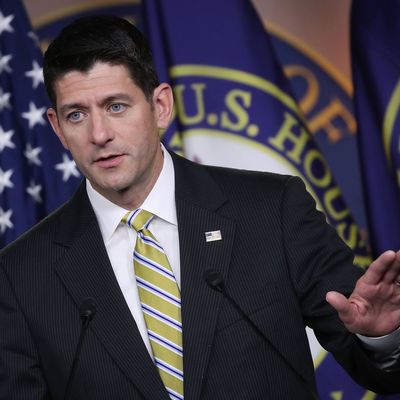
Last night, President Trump reiterated his belief that sabotaging the functioning of the federal government is an effective strategy for persuading Democrats to vote for his border wall.
Specifically, the president suggested that he might veto any spending bill that failed to include funds for his monument to American xenophobia, thereby allowing the government to shut down (and, almost certainly, his approval rating and that of his party to fall).
Paul Ryan thinks this would be a bad idea.
“I don’t think a government shutdown is necessary, and I don’t think most people want to see a government shutdown, ourselves included,” the House speaker told reporters in Oregon Wednesday.
Ryan went on to note that the House has already passed $1.6 billion in border wall funding. That appropriation has languished in the Senate, where Mitch McConnell lacks the votes to overcome a Democratic filibuster (a problem that a government shutdown is highly unlikely to solve).
“I don’t think anyone’s interested in having a shutdown,” Ryan continued. “I don’t think it’s in our interests to do so while we work on doing what we actually said we would do, what we’ve done already in the House and we need to do, which is to control our border. So I don’t think you have to choose between the two.”
Congress must pass funding legislation and a debt-ceiling hike by the end of September in order to avert a shutdown and debt default, respectively. Lawmakers will only have 12 legislative days to do both those things. Ryan said that, in light of this time crunch, the GOP leadership would push for the passage of a short-term continuing resolution, as opposed to a full 2018 budget.
Senate Republicans surely know that they can’t make their Democratic colleagues vote for Trump’s wall by threatening to shut down the government, given that the public tends to blame the party in power for political dysfunction. And Trump has given few indications that he’s willing to buck the judgement of his cabinet and congressional Republicans on policy matters (as opposed to rhetorical ones). It’s hard to imagine him single-handedly inducing a shutdown with a veto.
But the president’s endorsement of legislative hostage-taking could stiffen the spines of the House GOP’s most intransigent ideologues — and, thus, make Ryan’s September even more difficult than it was already shaping up to be.
Earlier this month, the House Freedom Caucus threatened to block any debt-ceiling hike that didn’t include massive spending cuts or deregulatory measures that would never survive the Senate.






























